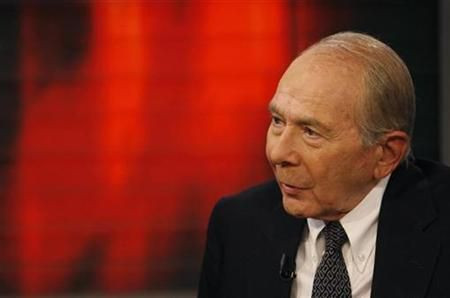Report: American International Group Mulls Joining Former CEO Maurice R. Greenberg In $25B Lawsuit Against US

American International Group, Inc. (NYSE:AIG) is facing a damned-if-you-do-and-damned-if-you-don't dilemma.
The New York-based insurance giant, which recently paid off the $182 billion in taxpayer money used to rescue it from insolvency following the subprime mortgage meltdown in 2008, is reportedly considering joining a $25 billion securities class-action lawsuit against the U.S. government that saved it from insolvency. It must consider the move to avoid possible shareholder lawsuits that would allege a breach of fiduciary duty.
But if it joins the lawsuit it will surely face a public relations problem, considering it would be suing the very entity that saved it: the American taxpayer.
The board of the New York-based transnational insurer will meet Wednesday to discuss whether to join former executive chairman Maurice “Hank” Greenberg, 87, in a securities class action lawsuit that his Starr International Company Inc., a major AIG shareholder, filed in November against the government. Greenberg's suit contends AIG's government bailout had unnecessarily burdensome conditions and amounted to an expropriation of assets that violates the constitutional protection against the seizure of private property without adequate compensation, according to Dealbook.
But AIG must consider its next move carefully.
For one thing, if Greenberg’s lawsuit against the government were to end up with a settlement, AIG could face a shareholder lawsuit for not participating in the suit. For another thing, Greenberg, who served as head of the company until 2005 when he was forced to step down amid an accounting fraud investigation but still remains a major stakeholder, could sue AIG in a bid to force it to join his lawsuit against the government, an action Greenberg might take to boost strength his case against the government.
However, joining a lawsuit against the government that rescued it (and its shareholders) will certainly be viewed as an audacious move for a company that became a symbol of the “too big to fail” phenomenon that caused the taxpayers to bail out financial services companies in the Great Recession. If taxpayers had not extended emergency loans to AIG to cover its liquidity crunch, the company would have filed for bankruptcy and its shareholders would have lost their shirts.
"On the one hand, from a corporate governance perspective, it appears they're being extra cautious and careful," Frank Partnoy, a former banker who is now a professor of law and finance at the University of San Diego School of Law, told Dealbook. "On the other hand, it's a slap in the face to the taxpayer and the government."
Greenberg is reportedly traveling to AIG headquarters in lower Manhattan on Wednesday to try to sell the company on the idea of joining the lawsuit, which would bolster his cause.
Starr International’s lawsuit contends that AIG was forced to sell two valuable units -- American Life Insurance Company and American International Assurance Company, Ltd. -- and that this was an illegal expropriation that cost $25 billion in damages to over 500 million shares of common stock in the insurer.
As the real estate bubble burst, AIG’s share price plummeted from over $1,400 in late 2007 to under $20 a year later. The company’s share price opened Tuesday at $35.93, down slightly from Monday’s close of $36.30.
© Copyright IBTimes 2024. All rights reserved.





















